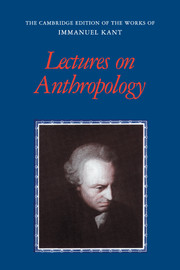Book contents
- Frontmatter
- Contents
- General editors’ preface
- Preface
- Abbreviations
- General introduction
- Anthropology Collins 1772–1773
- Anthropology Parow 1772–1773
- Anthropology Friedländer 1775–1776
- Translator's introduction
- Lecture of the Winter Semester 1775–1776 based on the transcriptions Friedländer 3.3 (Ms 400), Friedländer 2 (Ms 399) and Prieger
- Anthropology Pillau 1777–1778
- Menschenkunde (1781–1782?)
- Anthropology Mrongovius (1784–1785)
- Anthropology Busolt, 1788–1789
- Editorial notes
- Glossary
- Bibliography
- Index
Translator's introduction
Published online by Cambridge University Press: 05 April 2013
- Frontmatter
- Contents
- General editors’ preface
- Preface
- Abbreviations
- General introduction
- Anthropology Collins 1772–1773
- Anthropology Parow 1772–1773
- Anthropology Friedländer 1775–1776
- Translator's introduction
- Lecture of the Winter Semester 1775–1776 based on the transcriptions Friedländer 3.3 (Ms 400), Friedländer 2 (Ms 399) and Prieger
- Anthropology Pillau 1777–1778
- Menschenkunde (1781–1782?)
- Anthropology Mrongovius (1784–1785)
- Anthropology Busolt, 1788–1789
- Editorial notes
- Glossary
- Bibliography
- Index
Summary
The question of the Bildung or education of humanity, in particular the Enlightenment goal of human perfectibility, is germane to all the anthropology lectures, but it is especially apropos in the case of the Friedländer lectures to situate them historically in relation to the education reform movements of the long eighteenth century. The lectures date from the time of Kant's most active involvement with and support for an institution of education, the Philanthropin (founded in 1774 in Dessau). Its program of education (based on Lockean, Rousseauian, and Enlightenment principles) and the writings of its founder, Johann Bernhard Basedow, inspired the major educational reform movement of his day, Philanthropinismus. In his first set of lectures on pedagogy (also from this period, 1776/77) Kant used Basedow's Methodenbuch as the basis for his course. Together with his reading over a decade earlier of Rousseau's Émile, Or On Education (with its critique of Locke's educational program laid down in Some Thoughts Concerning Education), his interest in the moral weeklies (the English Spectator, for example, is referenced in the Friedläender lectures), his correspondence with the education reformers and of course his own experience both as student and teacher, Kant had first-hand knowledge of and engagement in the education reform issues.
- Type
- Chapter
- Information
- Lectures on Anthropology , pp. 39 - 42Publisher: Cambridge University PressPrint publication year: 2012

